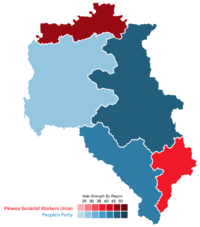Portal:Kylaris/Features: Difference between revisions
No edit summary |
No edit summary |
||
| Line 1: | Line 1: | ||
<div style="float:left;margin:0.5em 0.9em 0.4em 0;">{{Region icon Kylaris}}</div> | <div style="float:left;margin:0.5em 0.9em 0.4em 0;">{{Region icon Kylaris}}</div> | ||
[[File: | [[File:Piraea_February_1980_Election_Map.png|thumb|200px|Most voted-for party by region in Piraea proper.]] | ||
The '''1980 Piraean general election''' was the first democratic election of [[Second Piraean Republic|Piraea]] after the {{wp|military dictatorship}} to elect the members of the [[Piraean Senate|Piraean Courts]] (now Senate) and the new premier of the republic. It was extraordinarily held on 1 February 1980 and marked the start of the [[Piraea]]n {{wp|metapolitefsi}}. | |||
The elections were agreed in 1979, after the military junta lost the [[1979 Piraean national plebiscite|national plebiscite]] in which it sought to legitimise a new leader. In September of 1979, the two largest parties of Piraea, the [[Piraese Socialist Workers Union|PSEE]] and the [[People's Party (Piraea)|People's Party]], signed, together with other minor legal parties, the conditions for the transition under the [[1979 Hankssun 300 Pact|Hankssun 300 Pact]]; the military junta agreed the disassociation from the new government and institutions on the conditions of {{wp|inmunity}} and the outlaw of the [[Piraese Section of the Workers' International]]. Most of the members of the illegal PTED participated under the [[Progressive Federation (Piraea)|Progressive Federation]] platform together with other clandestine leftist minor groups. | |||
('''[[ | |||
After the general elections the 1st Legislature of the [[Piraean Senate]] were formed, with an {{wp|absolute majority}} from the [[People's Party (Piraea)|People's Party]], which counted with the [[Piraese Socialist Workers Union|PSEE]] as the {{wp|main opposition}} party. The new premier, [[Ioannis Apostolou]] was invested with the votes of LK and [[Centre Union (Piraea)|Centre Union]], while the [[Second Piraean Republic|post-Functionalist]] {{wp|far-right}} proposed their abstention. | |||
('''[[1980 Piraean general election|See more...]]''') | |||
<div style="text-align:right>[[File:KylarisRecognitionAchievement.png|25px]] '''{{cl|Kylaris Articles of Recognition|See all articles of recognition}}'''</div> | <div style="text-align:right>[[File:KylarisRecognitionAchievement.png|25px]] '''{{cl|Kylaris Articles of Recognition|See all articles of recognition}}'''</div> | ||
Revision as of 16:30, 2 March 2023
The 1980 Piraean general election was the first democratic election of Piraea after the military dictatorship to elect the members of the Piraean Courts (now Senate) and the new premier of the republic. It was extraordinarily held on 1 February 1980 and marked the start of the Piraean metapolitefsi.
The elections were agreed in 1979, after the military junta lost the national plebiscite in which it sought to legitimise a new leader. In September of 1979, the two largest parties of Piraea, the PSEE and the People's Party, signed, together with other minor legal parties, the conditions for the transition under the Hankssun 300 Pact; the military junta agreed the disassociation from the new government and institutions on the conditions of inmunity and the outlaw of the Piraese Section of the Workers' International. Most of the members of the illegal PTED participated under the Progressive Federation platform together with other clandestine leftist minor groups.
After the general elections the 1st Legislature of the Piraean Senate were formed, with an absolute majority from the People's Party, which counted with the PSEE as the main opposition party. The new premier, Ioannis Apostolou was invested with the votes of LK and Centre Union, while the post-Functionalist far-right proposed their abstention.
(See more...)
